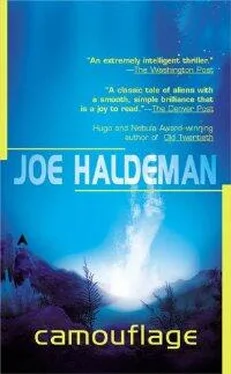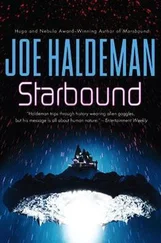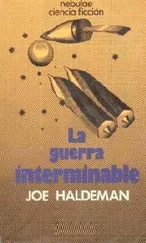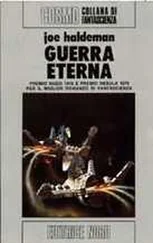The changeling went through the door where the exit sign glowed dim green, enjoying the last whiff of chlorine trapped inside the mask.
Outside, twenty men were sprawled around in various attitudes of misery, coughing and retching. There were spatters and pools of vomit everywhere. The changeling ordered his stomach to eject its contents.
A friend, Hugh, came over to where he was kneeling and pounded him on the back. “Geez Louise, Jimmy. You musta held your breath three minutes.”
The changeling coughed in what it hoped was an appropriate way. “Swim a lot underwater,” it said breathlessly. “God, don’t that stuff smell awful?”
But the memory of nostalgia was strong. Where on Earth could it have lived, where chlorine was so concentrated in the air? Nowhere on the surface. That would be a good research project, after the war.
A lot of their training had a quality of improvisation, since much of the material of war had already left for the Pacific. So they learned how to work with tanks by advancing in formation behind a dumptruck carrying tank signs wired to its front and rear. They carried World War I Springfield rifles and practiced with them on the range.
Hand-to-hand combat training was a ballet of restraint for the changeling, who had been a remorseless predator for most of its life. It allowed the other trainees to throw it around and simulate dangerous blows. When it was its turn to be aggressive, it spared everyone’s lives, knowing it could rip off one person’s leg and beat everybody else to death with it.
It was properly respectful to the sergeants, and studied their individual ways with the men. Those techniques were more interesting than the coercive strategies of college professors, who presumably had intellectualized the process. The sergeants instinctively reached back into primate behavior, becoming the dominant male by shoving and punching and screaming. Anyone who resisted them was punished— immediately and then again later, with assignments, “shit details,” that were degrading and exhausting.
The changeling did its share of those—cleaning toilets with a toothbrush and pulling twenty-four-hour kitchen police—not, of course, because it had actually lost its temper or misread the sergeants’ desires. Too much self-control would make it conspicuous. It had to play the game.
Apia, Samoa, 2020
Russ and Jack, especially, agonized over the contract, distrusting the government on principle, but unable to deny either the financial argument or the scientific one. They faxed it to their Chinese and stateside lawyers, and they agreed that it was what it claimed to be.
They signed it on Friday, and on Saturday morning their work crew was suddenly tripled, cargo helicopters thrumming in hourly with the prefabricated materials for their laboratory’s exoskeleton.
The carpenters and painters who were putting the finishing touches on the lab were nonplussed, to say the least. The elegant heat exchange system was carved away and replaced with heavy- duty machinery. The carefully glazed windows that looked out on the ocean now had a view of plain steel plate.
The moat was filled with fast-setting plastic concrete that supported the footers for the new metal walls and roof. NASA dug a new moat, wider and deeper and open to the sea: the lab became an artificial island fortress.
The twelve scientists, seven women and five men, were sensitive to turf. They never approached the artifact unaccompanied by the original team; they spent hours every day comparing notes with them, planning out approaches. It was a congenial, collegial mix, everyone linked by passionate curiosity.
None of the NASA scientists knew that the SNAP-30 reactor had been modified so that it could function as a bomb. Some of the mass that they thought was shielding was actually extra plutonium. Nesbitt had known, but his first allegiance was to the NSA, “No Such Agency,” not NASA.
And he was no longer in the picture.
The NASA team was “all chiefs, no Indians,” officially, but their nominal leader was Jan Dagmar, a white-haired exobiologist old enough to remember the first moon landing and young enough to go cave-diving for fun. She had advanced degrees in both physical and life sciences, on top of a B.A. in philosophy.
Her eleven compatriate scientists worked daily with the members of the original Poseidon team, and they worked together with them away from the site, too, comparing notes, planning out approaches. They all lived together in the Vaiala Beach Cottages, where number 7 was designated the common room, a big coffee urn always going, refrigerator and pantry full of food for thought.
Russell spent a lot of time in fale number 7, and had moved into number 5, leaving the fancy suite at Aggie Grey’s, a ten-minute bicycle ride away. Jack stayed at his, saying he could think better in air-conditioning.
They all agreed, although Jack was characteristically impatient, to wait until the isolated environment was finished before starting their tests. So they had eight days of brainstorming their approaches. Equipment and supplies came in daily from Honolulu, Sydney, Tokyo.
The night before the first tests, Russ called Jan and they met at the rocks overlooking the site to share a bottle of the best champagne he could find in Samoa. The relationship that was developing between them was not exactly romantic in a conventional sense, but they had discovered in each other a kind of romantic reverence toward nature and science that went back to childhood. They had both wanted to be astronauts as children; Russell had actually been accepted as a mission specialist when the Challenger disaster put everything on hold, and he switched over to the doomed Mars missions.
They shared champagne and a pair of powerful binoculars, studying the crescent moon in the clear dark sky. The nightglass stabilizers hummed and clicked while he looked down the terminator edge and named the craters—Aristarchus, Messier, Globinus, Hell. “That’s a deep one,” he said.
She laughed. “I used to know some of the names. My dad had a telescope.”
“You said they moved down to Florida to watch the moon rockets.” She nodded in the darkness. “And all the other ones, the shuttle and all. But the Apollo rockets were the biggies—Saturn V’s. Deafening: you could feel the noise rattling your bones. And dazzling, the one they did at night.”
“That was the first one?”
“No, the last. The first one was Apollo 11, in 1969.”
“Oh, yeah. I slept through it, my mother said. I was not quite two.”
“I was twelve,” she said, refilling her glass. “The first time I ever tasted champagne. Still makes me think of it.”
They stared out over the project into the night, in companionable silence. The dim yellow security lights attracted bugs; small birds swooped out of the darkness. “This may be even bigger,” she said. “It almost certainly will be.”
“Even if it turns out to be homegrown,” he said, “we’ll have to totally rethink physics and chemistry.”
“Chemistry is physics,” she said automatically. “Tell you what. If this thing turns out to be terrestrial in origin, I’ll buy you the most expensive bottle of champagne in the Honolulu duty-free.”
They clicked glasses. “If not, I’ll buy you two.”
“What, you’re that skeptical?”
“Hell, no; I agree with you. And I’ve got an expense account.”
A test area, about four inches square, was marked off by tape on the artifact’s side, about midway. An electron microscope and its positron equivalent could be easily brought to bear on the area. They built a forced-draft hood over it, to suck away and analyze poisonous vapors.
Читать дальше












